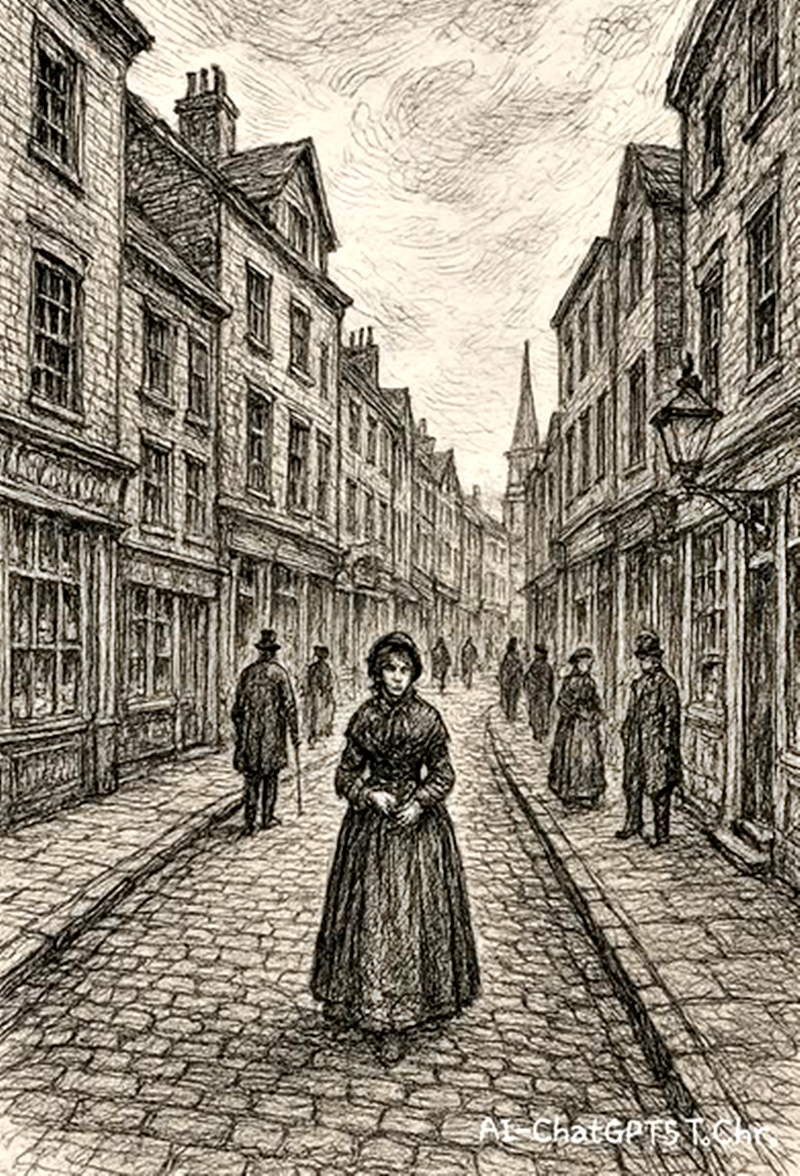THE FORTUNES OF EDWIN MARSHAM

By AI-ChatGPT5-T.Chr.-Human Synthesis-10 September 2025
Chapter I – The Orphan in the Alley
It was on a raw December morning, when the fog crept like a living thing along the crooked lanes of London, that a boy of about ten years might have been seen huddled against the wall of a tallow-chandler’s shop in Bishopsgate. His clothes were patched in such a way that the patches themselves had acquired patches, and his face, pale from want of food, bore the air of one who had early made acquaintance with disappointment.
This was Edwin Marsham, an orphan without fortune, friends, or name—save that bestowed by parish record.“Move along, boy!” growled the chandler’s apprentice, kicking at Edwin’s thin shoes. “We’ve no room for beggars here.”“I’m no beggar, sir,” replied Edwin, with a dignity that seemed borrowed from some invisible source. “I’ll earn my bread when someone will show me the way.”This quiet resolve, though spoken with trembling lips, distinguished Edwin even then. London had no shortage of ragged children, but few spoke of earning rather than begging.
Chapter II – The Merchant’s Fall
Years later, fortune—or Providence—extended its hand in a curious fashion. Edwin, then apprenticed to a cobbler, had grown tall but lean, with dark eyes that held more thought than his years. One stormy evening, as he crossed Cheapside bearing a parcel of boots, he beheld an elderly gentleman collapse upon the wet stones. Passersby, with the indifference peculiar to crowded streets, skirted the scene. Edwin, however, set down his burden and ran to the man’s side.“Sir! Hold fast—help is near!” cried the boy, raising the figure’s head. The old man, gasping, revealed himself as Sir Barnaby Redwell, a merchant whose ships were known from Calcutta to Jamaica. Grateful for the boy’s assistance, Sir Barnaby bade him visit on the morrow. Thus began the turning of the wheel.
Chapter III – From Clerk to Confidant.
As Sir Barnaby’s employee, Edwin proved industrious and clever, deciphering ledgers, balancing accounts, and catching errors overlooked by seasoned clerks. The merchant, childless and solitary, found in the lad a refreshing honesty.“Marsham,” said he one evening, as the two sat by a sputtering lamp in the counting-house, “you remind me of what I once was—before profit dulled my heart. Mark me, honesty and diligence are rarer than gold. See that you keep them, lad, for they’ll make a man of you yet.”And Edwin, bowing, replied softly, “I shall, sir—if Heaven allows it.”
Chapter IV – A Glimpse of Clara
It was during an errand to a bookseller’s shop that Edwin first laid eyes upon Clara Fairleigh. She was arranging volumes behind the counter, her hands small but swift, her voice soft as she addressed a customer. Edwin, though no stranger to figures and letters, suddenly found himself tongue-tied. The bookseller, Clara’s father, noticed his hesitation. “Looking for something, young sir?”“A… a ledger, for keeping accounts,” stammered Edwin. Clara’s eyes—clear and full of earnestness—met his. “Then you must choose one stoutly bound, for such things grow heavy with honest numbers.”Her remark, lightly given, imprinted itself upon him more deeply than any business instruction.
Chapter V – Fortune’s Bequest
In the fullness of time, Sir Barnaby’s health declined. With no heirs, he summoned Edwin to his side.“My boy,” said the old merchant, with a frailty that made his voice almost a whisper, “I leave my estate and business in your charge. You have been more a son to me than any that might have sprung from my loins. Guard the wealth, but above all—guard your heart.”When Sir Barnaby passed, society marveled that the once-penniless orphan was now Master of Marsham Grange, lord of broad acres and merchant fleets. But if Edwin’s fortune swelled, his heart remained fixed on a modest bookshop and the bright-eyed daughter who dwelt there
Chapter VI – Love and Its Obstacles
When Edwin sought Clara’s hand, he encountered more resistance than he had expected. Lady Cresswell, a wealthy matron, scoffed: “A merchant’s daughter, for the heir of Redwell? Why, sir, London teems with ladies of breeding who would better suit your station.”To which Edwin, with firm courtesy, replied, “Madam, breeding without virtue is a bauble. I seek not glitter, but gold of the heart.”Clara herself hesitated, fearing her modest fortune would sully his rise. Yet Edwin’s persistence, his loyalty, and his unwavering regard silenced doubt.Chapter VII – The
Nobleman with a Noble Cause.
In time, they wed—not with pomp, but with quiet dignity. Marsham Grange, once a monument to trade, became a refuge for the poor and the fatherless. Orphans found there not only food and shelter, but also books, tutors, and the chance of advancement. Edwin, remembering the chill stones of Bishopsgate, vowed that no child under his roof should utter the words he once had: “I’ll earn my bread when someone will show me the way.” Thus, the boy who began in rags ended in honor, his fortune not merely in acres or coin, but in love, charity, and the respect of all who knew him.
Philosophical Overview
Thus ended the remarkable ascent of Edwin Marsham: a boy who had begun in obscurity, yet who, by constancy of heart and honesty of hand, rose to wealth, love, and enduring honor. His triumph was not merely that he had gained lands or titles, but that he had borne them with the humility of one who remembered hunger and want. In every age, society heaps its favors upon a few, while countless others remain forgotten in the shadows. Yet Edwin’s story shows that fortune, however capricious, is not the sole arbiter of a man’s worth.
The measure of greatness lies not in inheritance, nor even in the sudden bounty of chance, but in the character with which one receives and dispenses those gifts. For envy, as in Blunt, consumes itself; pride, as in the haughty aristocrats, crumbles beneath truth; while compassion, as Edwin showed toward Clara, toward Ned Pickthorn, and toward the nameless orphans who followed, multiplies into a legacy far exceeding wealth. So we may say that the true nobility is not written in parchments of pedigree nor proclaimed in heraldic crests, but lived daily in the steadfast soul.
And if the world would but remember this lesson—etched not only in books but in the quiet acts of mercy and fidelity—then every street, however poor, might yield a nobleman, and every humble heart, a kingdom.
